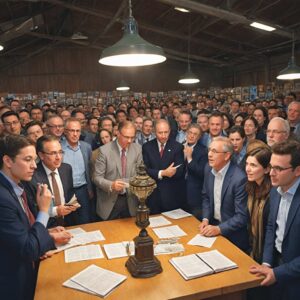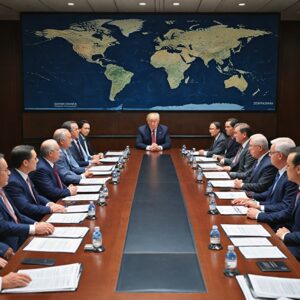Summary
Harsh Jain, CEO and Co-Founder of Dream11, a leading Indian sports technology company, has publicly expressed both excitement and frustration regarding Tesla’s entry into the Indian electric vehicle (EV) market. Tesla’s launch in India has been highly anticipated amid recent government policy changes aimed at promoting EV adoption, including significant reductions in import duties on electric vehicles priced above $40,000. Despite these policy shifts, Tesla’s arrival has faced multiple delays, regulatory hurdles, and challenges related to pricing and local manufacturing commitments.
Jain, an early Tesla reservation holder since 2017, criticized Tesla for canceling priority booking slots and refunding the $1,000 reservation fee without honoring the early commitments made to Indian customers. This move drew considerable attention as a notable controversy, highlighting tensions between Tesla and its loyal Indian fanbase. Jain’s vocal stance underscores the broader consumer frustration surrounding Tesla’s cautious and incremental approach to the Indian market.
Tesla’s entry is expected to influence India’s emerging EV ecosystem by accelerating premium electric vehicle adoption, although competition from domestic automakers like Tata Motors and Mahindra remains strong. While Tesla plans to open showrooms in major cities such as New Delhi and Mumbai and has expressed interest in establishing local manufacturing facilities, the company’s long-term success in India depends on navigating complex regulatory frameworks and addressing affordability challenges.
Overall, the unfolding dynamics of Tesla’s Indian launch, marked by strategic policy shifts, consumer expectations, and industry responses, position Harsh Jain’s engagement as a prominent reflection of both the promise and the controversies shaping the future of electric mobility in India.
Background
Harsh Jain is the CEO and Co-Founder of Dream Sports, a leading sports technology company in India known primarily for its flagship product, Dream11. Founded in 2008, Dream11 became the first Indian gaming company to enter the unicorn club, marking a significant milestone in the country’s startup ecosystem. Jain’s entrepreneurial journey was shaped early on by his education in India and abroad, including time spent in England where he developed a keen interest in fantasy sports. During an internship, he realized his passion for entrepreneurship, which greatly influenced his future endeavors in the sports technology domain. Before achieving success, Jain experienced a failed e-commerce venture that he regards as a crucial learning experience. This setback helped him understand important aspects such as market fit, customer needs, and the necessity of a strong business model. These lessons profoundly influenced his approach to building and innovating in the startup world. Under his leadership, Dream Sports has expanded its portfolio to include over 250 million users across multiple brands, such as FanCode, DreamSetGo, Dream Game Studios, and Dream Foundation, solidifying its position as a powerhouse in the Indian sports technology landscape.
Tesla’s Entry into the Indian Market
Tesla’s entry into India coincides with significant shifts in the country’s electric vehicle (EV) policies aimed at accelerating EV adoption. A major development came with the Union Budget’s revision of import tariffs: the duty on EVs priced over $40,000 was reduced from 100% to 70%, while vehicles priced below $40,000 continue to attract a 70% import tariff. This policy change is designed to encourage the uptake of electric vehicles and reduce the cost burden on consumers, thereby making Tesla’s premium models more accessible to Indian buyers.
Tesla initially planned to enter the Indian market in 2022 but faced several hurdles, including high import duties, regulatory challenges, and difficulties in establishing EV infrastructure in the emerging economy. These setbacks delayed their launch until 2025, when Tesla announced showroom openings in New Delhi and Mumbai, signaling its intent to boost India’s electric mobility landscape with advanced technology and premium EV offerings.
Despite tariff reductions, the import duties remain substantial, limiting Tesla’s pricing competitiveness. For instance, the Tesla Model 3, the company’s most affordable model globally, is expected to cost roughly ₹40 lakh in India after tariffs, which restricts Tesla largely to the luxury EV segment. Industry analysts anticipate Tesla will focus on higher-end models to maximize duty benefits under the new policy, rather than launching budget-friendly vehicles, which do not currently fit Tesla’s global portfolio or the Indian import threshold requirements.
Tesla’s challenges extend beyond tariffs. The company must navigate complex regulatory frameworks, including local sourcing norms and foreign investment rules, which may further complicate its pricing and operational strategies until local manufacturing facilities, such as a potential future Gigafactory, can be established. Moreover, Tesla will face competition from strong domestic players like Mahindra and Tata, which produce EVs tailored to Indian market needs, potentially confining Tesla to a niche luxury segment.
In addition to central government policies, individual Indian states have introduced their own EV incentives, including subsidies and road tax discounts aligned with the national Faster Adoption and Manufacturing of Electric Vehicles (FAME) scheme. These state-level incentives further support EV affordability and infrastructure development, indirectly benefiting Tesla’s market entry prospects.
However, Tesla’s prolonged delay and communication with early Indian supporters have drawn criticism. For example, Dream11 CEO Harsh Jain publicly expressed frustration over Tesla’s handling of priority slots booked by fans nearly a decade ago, highlighting a $1,000 pre-launch reservation fee that Tesla has only promised to refund without additional compensation. This dissatisfaction reflects broader tensions between Tesla and its Indian fanbase amid the company’s cautious and incremental market entry.
Harsh Jain’s Involvement and Claims
Harsh Jain, CEO of Dream11, publicly expressed his frustration and criticism towards Tesla regarding the company’s handling of early reservations for its India launch. Jain revealed that he had paid a $1,000 deposit in March 2017 to secure a priority slot for a Tesla Model 3 when bookings first opened in India. However, nearly a decade later, as Tesla prepared for an official launch in the country, the company decided to cancel these priority slots and refund the reservation amount without honoring the early commitments. Jain highlighted this move as a significant disappointment to loyal fans and early believers in India, stating that it was turning them into “haters” of the brand.
Jain further elaborated on his frustration by sharing Tesla’s communication, which explained that the original Model 3 reservation was replaced due to changes in the product lineup. Tesla assured potential customers that it was finalizing its product offerings for India and hoped to re-engage with the market upon launch readiness. Nonetheless, Jain emphasized the financial and emotional implications of the delayed entry and the refund policy, underscoring the impact on early supporters like himself.
This incident also occurred amid broader challenges Tesla faced in establishing a manufacturing presence in India. Despite initial participation in government discussions about local manufacturing incentives, Tesla ultimately did not proceed with plans to build EV factories in the country, unlike other automakers such as Mercedes-Benz, Skoda-Volkswagen, Hyundai, and Kia. Meanwhile, Tesla’s delayed launch and reservation handling further complicated its reception among Indian consumers and enthusiasts.
Jain’s vocal stance reflects his broader engagement with innovation and consumer advocacy, tying into his entrepreneurial vision and user-centric approach demonstrated through his leadership at Dream11.
Strategic and Market Implications
The arrival of Tesla in the Indian market has generated significant speculation regarding its impact on the domestic automotive industry and consumer behavior. Industry experts like Gurmeet Chadha, CIO & Managing Partner at Complete Circle Consultants, consider the market’s initial reaction to Tesla’s entry as somewhat exaggerated, suggesting that Tesla’s presence could drive premiumisation within the Indian car segment and open up new opportunities for automakers affected by the disruption.
From a consumer perspective, the delay and handling of Tesla’s launch have caused frustration among early enthusiasts. Harsh Jain, CEO of Dream11 and an early Tesla reservation holder since 2017, publicly expressed his disappointment after Tesla refunded his $1,000 deposit without honoring his priority slot for the Indian launch. Jain criticized Tesla and Elon Musk for alienating loyal Indian fans, emphasizing that such actions could turn Tesla’s early supporters into detractors and potentially damage the brand’s reputation in India. Despite this, Jain has expressed eagerness to be among the first to purchase a Tesla once the company officially launches in India.
The strategic implications of Tesla’s entry into India extend beyond market dynamics to influence manufacturing decisions, consumer preferences, and competitive behavior within the country’s emerging electric vehicle ecosystem. While Tesla’s delayed approach and cautious stance on local production present challenges, its presence is expected to catalyze a shift towards premium electric vehicles and stimulate broader adoption of EV technology in India.
Industry and Market Reactions
Tesla’s much-anticipated entry into the Indian market has elicited notable reactions across the automotive industry and stock markets. Following the announcement, shares of established domestic automakers such as Mahindra & Mahindra and Tata Motors experienced a decline, reflecting investor concerns about increased competition. However, analysts consider this initial market response to be an overreaction. Gurmeet Chadha, CIO & Managing Partner at Complete Circle Consultants, pointed out that Tesla’s arrival could actually accelerate the premiumisation trend within the Indian automobile sector, potentially benefiting certain market segments in the long term.
The impact of Tesla’s entry is expected to influence the manufacturing strategies of local automakers, as they adapt to the evolving competitive landscape. Tata Motors and Mahindra already possess significant experience in the electric vehicle (EV) domain, with a deep understanding of Indian consumer preferences and cost dynamics. This established presence may help them retain market share despite Tesla’s entry. However, Tesla faces challenges in establishing a robust retail presence due to regulatory hurdles and infrastructural limitations that have previously delayed its India launch.
Indian consumers’ strong preference for affordable vehicles presents another critical factor. Tesla’s premium pricing may limit its appeal unless the company introduces more cost-effective variants tailored to the Indian market. Additionally, government initiatives such as the Faster Adoption and Manufacturing of (Hybrid &) Electric Vehicles in India (FAME) scheme and various state-level EV subsidies aim to promote electric mobility by improving affordability and incentivizing manufacturers and buyers. These policies may provide a supportive environment for Tesla as it attempts to expand its footprint.
Despite initial challenges, Tesla is set to establish showrooms in major cities like New Delhi and Mumbai, aiming to contribute to India’s electric mobility goals with its advanced technology and premium offerings. Industry insiders note that while Tesla’s presence intensifies competition, the overall effect on domestic automakers’ long-term prospects is likely to be moderate, as the EV market in India continues to evolve rapidly.
Controversies and Criticisms
Harsh Jain, the CEO and co-founder of Dream11, publicly criticized Tesla for its handling of early reservation fees and priority slots related to the company’s launch in India. Jain had paid a $1,000 deposit in March 2017 to reserve a Tesla Model 3 when Tesla first opened bookings in the country. However, nearly a decade later, Tesla refunded his reservation fee and canceled his priority slot without honoring the initial commitment. This action sparked Jain’s frustration, which he expressed openly on the social media platform X, directly tagging Elon Musk and accusing Tesla of turning loyal fans and early believers in India into “haters”.
In his posts, Jain lamented the lack of commitment from Tesla towards Indian customers and highlighted that the refund decision came after a long wait, undermining the loyalty of early supporters. He also pointed out the missed financial opportunity, noting that if he had invested the same amount in Tesla shares at the time of his reservation, the value would likely have been significantly higher. This episode drew attention to Tesla’s challenges in establishing a strong retail presence in India, where consumer priorities such as affordability and competition from established domestic automakers like Tata Motors and Mahindra complicate market entry.
Future Prospects
Harsh Jain’s visionary leadership and relentless work ethic have been instrumental in building Dream11 into a pioneering platform in fantasy sports, reflecting his belief in strong partnerships both within and outside his organizations. This same proactive approach is evident in his engagement with Tesla’s entry into the Indian market.
Tesla has shown renewed interest in expanding its operations in India, including plans to potentially establish a Gigafactory with an annual capacity of 500,000 vehicles and an investment ranging between $2-3 billion. The company aims to introduce an affordable electric vehicle model priced between ₹20-25 lakh to appeal to Indian consumers. Tesla’s retail operations are expected to launch imminently, with showrooms planned across major Indian cities.
Despite this enthusiasm, the company’s approach towards early Indian supporters, including Harsh Jain, has faced criticism. Tesla’s communication has indicated ongoing adjustments to its product lineup for India, leading to some dissatisfaction among loyal customers awaiting a launch. Moreover, while Tesla’s entry is poised to disrupt the Indian automotive sector, it faces challenges from the existing competitive domestic EV industry, led by manufacturers like Mahindra and Tata, who produce vehicles better suited for local market conditions at significantly lower prices.
The Indian EV market is still emerging, with electric vehicles comprising less than 3% of total passenger vehicle sales. Government initiatives such as the Faster Adoption and Manufacturing of (Hybrid &) Electric Vehicles (FAME) scheme provide substantial incentives to boost EV adoption, including subsidies, interest-free loans, and state-specific benefits, which are crucial to increasing affordability and market penetration.
The content is provided by Blake Sterling, Fact-Nest













